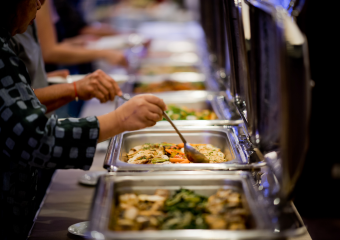City Council Passes Law Regulating Third Party Food Delivery Services City Council Passes Law Regulating Third … – Jersey City Times

A Jersey City ordinance regulating the likes of Grubhub, Uber Eats and DoorDash activity has reached the finish line and will take effect Aug. 1.
On Wednesday, the City Council voted 7-1 in favor of it on the second and final reading after Councilman James Solomon got to work some six months ago to ensure hundreds of restaurants and delivery drivers had protections utilizing the apps’ delivery services that took off during the COVID-19 pandemic.

A state law with limits on a companies’ fees on the food establishments had been set to expire at the time conversations were percolating.
“It’s really important. I think we’re protecting our restaurants. We’re putting in place safety protections. We’re putting in place worker protections. All those things are going to make Jersey City a better place,” said Soloman.

Councilwoman Denise Ridley dissented. Councilman Daniel Rivera left early to tend to a family emergency and did not return.
Ordinance 24-037 was developed after looking at legislation in New York City and other larger cities, as well as other municipalities like Hoboken.
The feelings of councilmembers surrounding the measure were a combination of appreciation for the amount of work required to regulate the industry and the need to better the conditions for those delivering on bicycles, scooters and electronic bikes.

But there was also a little hesitation in the chambers about how things might play out and acknowledgement that the language was never going to be perfect.

The Division of Commerce and its director Maynard Woodson will be in charge of implementation, which has brought forth questions of staffing in the past, while the Department of Public Safety and Office of Code Compliance will help with enforcement.
Operators of third-party delivery service will be required under the city’s amended Chapter 175 to get a license by paying $1000 per year the first three and then $500 annually thereafter. If they don’t comply with the various rules within 30 days of an alleged violation being identified, the permission could be revoked or other penalties could be applied under municipal code.
The third-party delivery companies may not charge restaurants a fee in excess of 5% of the order price if making available orders through the app, but not utilizing the companies’ contracted drivers. There also must be at least one “tier” of the “core delivery service” offered at no more than 15% when the third-party company’s delivery workers are utilized.
In the state law, the fee limits had been 10% and 20%, respectively. The delivery companies have been guilty of charging 15% for simply taking the order and as much as 35% for handling the delivery.
Under the ordinance, there are protections for the customer. One outlaws the third party service from charging a price that is higher than the menu price. Others are for the drivers, especially those on bicycles, scooters and electronic bikes.
The service can only solicit a tip for delivery workers if that full amount is provided to them and cannot bar access to an account due to declining to make a delivery. Additionally, establishments must make available bathrooms to the workers.
Chapter 242 is also amended, effective Oct. 1, to enhance the safety for the riders. Fines are a minimum of $50 to any person alleged to be in violation.
Companies or establishments will need to provide reflective vests to riders at least by the tenth delivery post-enactment.
Additionally, the Department of Infrastructure will develop a safety course. Within ten days, the companies or establishments must administer it to any rider making at least five deliveries per quarter. It must be completed within 30 days of it being made available.
Companies must maintain a roster of those riders who have completed the safety course and require them to annually verify that they have the necessary safety equipment such as helmet.
Councilman Yousef Saleh said the third-party delivery companies took in “profits made off the backs” of the laborers, delivery drivers and restaurateurs, and applauded the efforts of his colleague to set up a fee limit for services, as well as other stipulations such as that restaurants must provide access to restrooms.
“It’s a long time coming. Something has to be done on the local level when it comes to all the different parties at play,” he said. “We have the restaurants getting squeezed. We have the delivery drivers who are being rushed into delivering the food. That causes accidents and a lot of issues.”
Officials, including Saleh, emphasized though it’s best that personal information for delivery workers not be kept on file. The ordinance only stipulates the city needing the operator’s name, date of hire, date of discharge, and confirmation number for safety course completion. Saleh called that “middle ground.”
One consideration had been requiring and recording numbers on the reflective vests. But Solomon said that provision was removed after hearing feedback.
Solomon said the city’s met with Grubhub, Uber Eats and DoorDash representatives. One would “not acknowledge” the issues officials are trying to address while the other two seemed more open to “collaborating,” he said. Legal challenges are possible down the road on the issue of whether the municipality has the authority to execute such a law.
At the end of the day, he said this is just the “foundation” to address concerns and create “as level a playing field as we can” when the three big companies control the market, but “don’t really compete with each other.”
“You guys are so important to our community,” he said after hearing from several restaurant operators and delivery drivers that night. “You create jobs, you bring vitality, and we need to see you thrive and this is sort of a basic step we can take to help you keep more of your hard earned profits.”
Ridley felt the fees were “pretty good” for the restaurant owners, but that a few issues needed to be ironed out relating to safety. Ultimately, she was “not super comfortable with where they are on the delivery side.”
Ridley and others were interested in looking into tweaks to the ordinance down the road.





